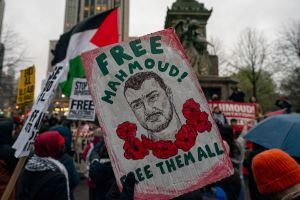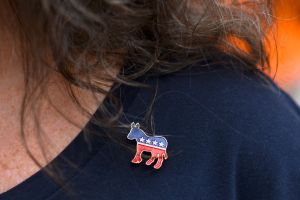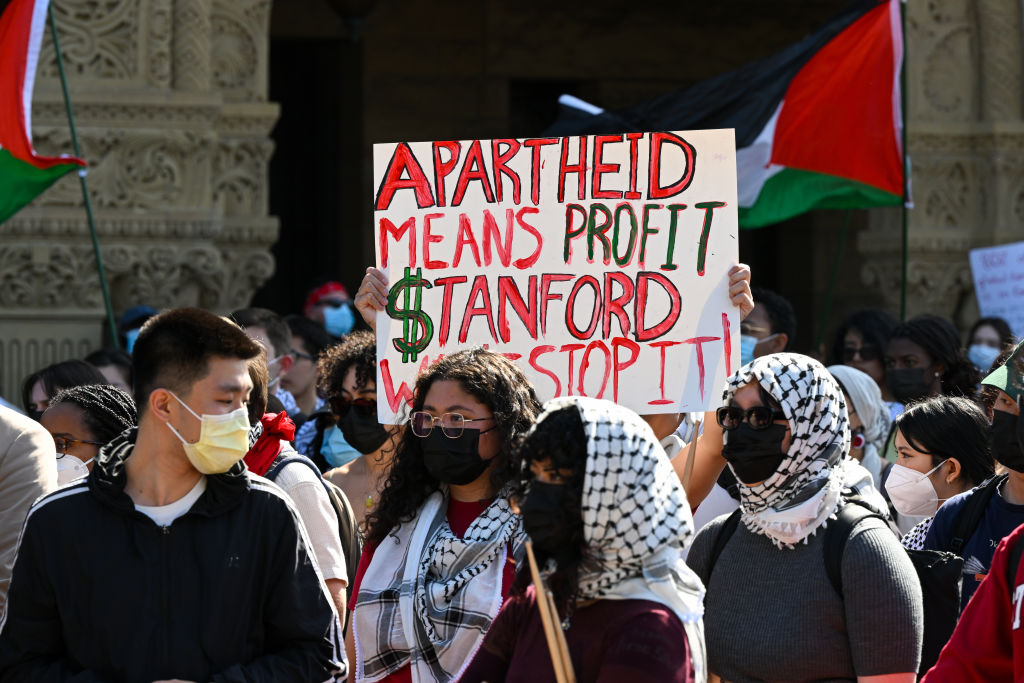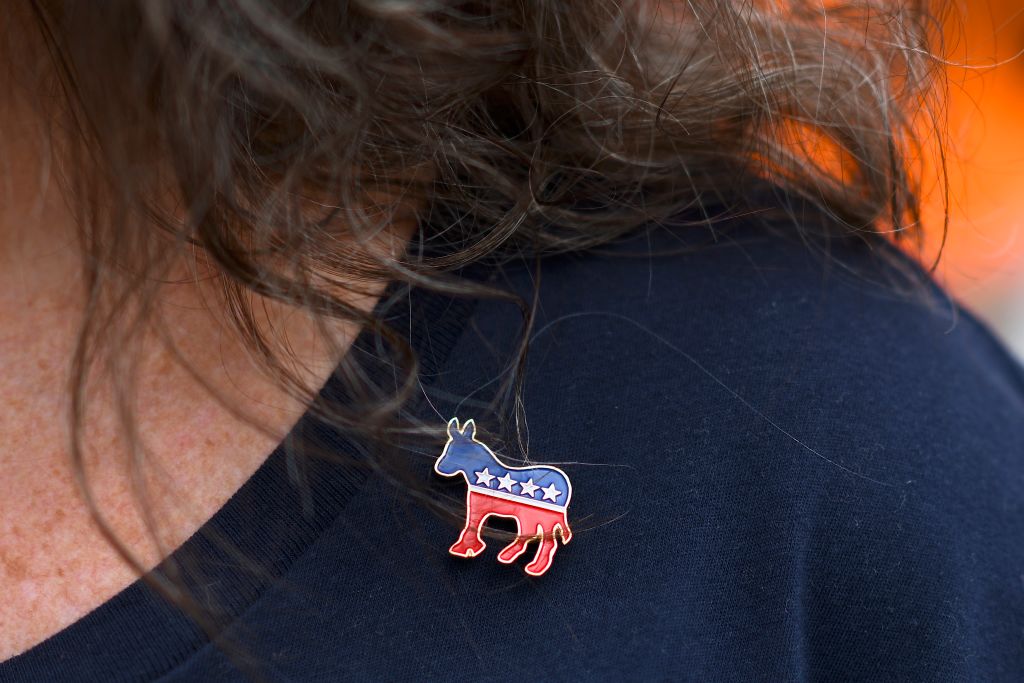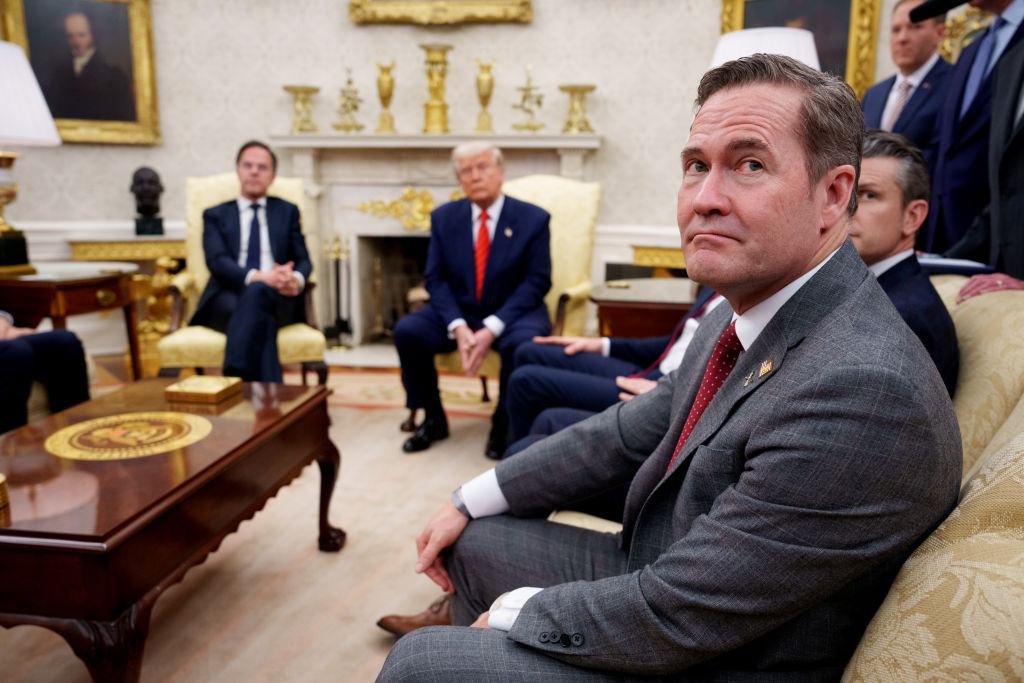‘Come in.’ Burly, brisk and maskless, Mike Pompeo indicates a chair before the marble fireplace. ‘It’s all right if we’re six feet — or two meters — apart.’
We are meeting at the State Department the day after Pompeo’s return from Qatar, where US negotiators have opened discussions with the Taliban and other Afghan factions on an end to the war in Afghanistan. It’s also the day before the signing of the Abraham Accords between Israel and the UAE and Bahrain. Cheerful and perhaps a little tired, Pompeo exudes forceful confidence: a man who knows what needs to be done.
As Secretary of State since 2018, Pompeo has been the strategist who has translated Trump’s generalities into the specifics of policy. He has played a key role in redefining American policy towards China. He has overseen the undoing of Barack Obama’s pro-Iran tilt and the securing of a diplomatic breakthrough in the Middle East between Israel and the Gulf Arab states. He has refurbished alliances with old allies and sought to bind new ones into an American-led order. Pompeo calls this strategy ‘principled realism’, but it’s also quite radical.
Pompeo was a China hawk before it was conventional: ‘It’s something that I’ve known for a long time.’ Trump, he says, saw it too. ‘If you go back and look at his comments from the [2016] campaign, there was this deep understanding that 40 years of policy was failing to protect the American people and, frankly, Western institutions: that the fundamental building blocks of international security were being undermined by the Chinese Communist party.’
The administration’s national security policy, Pompeo says, recognizes China’s challenge as more than military: ‘In every dimension, whether it’s diplomatic, economic…trade issues, intellectual property protection and the commercial aspects of the destruction of economic wealth in the West.’
Is China the new Soviet Union? ‘I think that turns on decisions that the Chinese Communist party makes in part, and how the West responds. If we are serious about caring about the rule of law and sovereignty. If we’re serious about requiring every nation that participates in the commercial marketplace to operate under a set of rules and understand that predatory economic activity won’t be acceptable.’
The Soviet Union’s leading exports were AK-47s and Marxism-Leninism. The Soviets never came close to matching America’s growing edges in technology and production. In the 2020s, by contrast, Xi Jinping has committed China to challenging the US in every sphere. China is the world’s biggest exporter. It is reconfiguring the physical infrastructure of Eurasia and the digital infrastructure through exports like Huawei’s 5G. It is using cheap goods and cheap loans to turn American allies into Chinese clients and, eventually, dependents. If this happens, Europe will be converted from a platform for the projection of American power through Nato into a captive market as the western terminus of China’s Belt and Road Initiative.
China’s neighbors, Pompeo says, ‘understand the risk that they become tributary states, the vassal states of China’. The Europeans are ‘now coming to realize’ it, too — Britain, sharply prodded by the Trump administration, has canceled its deal with Huawei. African countries are also ‘beginning to see that this Belt and Road Initiative was, in fact, too good to be true’, just as it seemed from the small print. ‘I think there is a global awareness that has been raised. I think the US has led on this in important ways and will continue to do that.’
The political scientist Graham Allison described in Destined for War: Can America and China Escape Thucydides’s Trap? how the interests of a rising power necessarily conflict with those of a declining power. It’s not obligatory, of course, that they actually go to war. But Xi Jinping has committed to China having a ‘world-class’ military by 2050 — and it’s the US that sets the global standard. Can America avoid armed conflict with China?
Pompeo leans forward. ‘I studied Graham Allison when I was a cadet at West Point many, many moons ago. I admire him.’ He smiles. ‘He’s just wrong. Just wrong. The fundamental assumption that he has is that the United States is a declining power. It’s just false…the United States continues to rise. We continue to improve. We continue to innovate. It continues to be the place people want to come study, where people want to come learn.’
The response to the challenge of a rising power should not be ‘appeasement’ or ‘weakness’ or ‘conciliation’, he adds. ‘It is demonstrating resolve and demonstrating strength.’ Not just the strength of the United States, but also in enhancing the capacity to build coalitions. ‘This is something that I’ve spent a lot of time on rethinking: how the multilateral elements of the world ought to operate, how the existing institutions, the post-Cold War institutions, may well not all be fit for prime time, for the challenges of the day.’
Pompeo reminds me of the diplomatic achievements that the Trump administration has already accumulated, most of which the media have ignored or diminished. The push for Nato members to meet their funding commitments. The calls for the United Nations and its subsidiaries to ‘understand the threat from Chinese infiltration’, and blocking China from controlling the World Intellectual Property Organization. The US and its allies would, he says, be ‘nuts to have a Chinese candidate in charge of world intellectual property’. But as recently as ‘six years ago’, he says, the US would have let that happen.
‘We’ve fundamentally rethought how we work to build our coalitions,’ he explains. ‘You’ll see India, Japan, South Korea, China — I think you’ll see increasingly Israel and Europe — you’ll see them all come to a set of shared common understandings about how we respond to China.’
In early 2018, the US was ‘a lone voice in the wilderness’ when it came to 5G. ‘And now I don’t think there’s a country in the world that doesn’t understand that having Huawei technology in your backbone presents a security risk. Some of them will struggle to get them out for economic reasons. But they all know that that risk exists, and that alone is a sea change.’
Preventing Russia from allying with China was vital to America’s Cold War strategy. Does he feel that relations with Russia, which declined steadily from 1990 to the 2016 elections, have improved?
‘It’s a mixed bag,’ he answers. The allegations of Russian collusion with Trump in 2016 have, he says, ‘tempered our capacity’ to engage with Putin, and there are areas such as Syria or Ukraine where Russia ‘continues to exert malign influence’. But there are also areas of productive engagement: ‘We have important strategic dialogue working successfully today on nuclear proliferation issues — we may well be able to have some success there before the end of the year — and we’ve worked with them on counterterrorism very successfully.
‘So it’s a complicated relationship. We want to have a successful, constructive relationship with the Russians, but it needs to be on terms that make sense for the people of the United States. And in a multipolar world, which is where we are, traditional things like spheres of influence return into play.’
Russia, he allows, has legitimate interests in eastern Europe, its historic sphere of interest, just as Iran has ‘legitimate security concerns’ and interests. ‘What you can’t do is run around the world as a sponsor of terror. You can’t run around the world poisoning people. You can’t run around the world undermining efforts for basic human rights… You can’t have probably the worst human rights violation of the century ongoing in western China today. It is just unacceptable.’
The principle that tempers Pompeo’s realism is Christian and constitutional. Pompeo believes in ‘fundamental ideas’ about ‘basic rights that every human being has because they’re created in the image of God’. He has created the Commission on Unalienable Rights, which goes ‘back to America’s founding principles’.
‘And I think the world sees that,’ he tells me. ‘And I think the Chinese Communist party is going to have to confront how they’re going to respond. If they truly want to maintain their power and their influence, they’re going to have to consider that the world is going to take these things seriously and there will be costs that are imposed on them when they behave in that way.’
The ‘Wuhan virus’, he says, could have arisen anywhere. Instead of ‘maximum transparency and maximum coordination’, the Chinese authorities ‘did just the opposite: they closed the system’. Key Chinese witnesses have been ‘disappeared’ or been ‘shut up’, including ‘the doctors who would most likely have known precisely where this came from’. Responsible global powers, Pompeo insists, ‘don’t engage with the world through obfuscation’. China, like the Soviet Union and other authoritarian regimes, has defaulted to ‘maximum coercion’ at home and isolation abroad. And that, he intimates, is where China will remain if it doesn’t adjust itself to US assertion of moral leadership.
Meanwhile in the multipolar world, the Trump administration is still trying to extricate itself from the George W. Bush administration’s War on Terror. The Doha talks were ‘really remarkable’, he says. ‘That doesn’t seem like much, to have people sitting in a room together and talk. But it’s been 19 years, and multiple administrations trying to achieve that very meeting. And it was a successful day. There are conversations that were had [that] moved us further in the right direction.’
The goal, Pompeo said, is ‘to reduce our footprint’ in Afghanistan, Iraq and Syria: to ‘reduce the risk to American lives and treasure’, and those of Nato allies, while ‘still delivering the security’. He is ‘very confident that we can achieve that’, and that it can be done in Iraq without a permanent US military presence. ‘Watch the Iraqi protesters and watch the protesters in Lebanon and what they’re asking for, and the protesters in Belarus. People have now found footing, found their voice in each of these places. And I think that’s certainly true in Iraq, that they’re tired of Iranian influence. The protests are demanding Iraqi sovereignty… I’m convinced it’s trending in the right direction.’
More than 60 percent of Iraqis are Shia, and Iran insists that it is their patron. Compared with this, reconciling the Gulf Arab states to Israel looks almost simple. But it is, of course, remarkable.
Trump has a gambler’s luck — or did until the COVID-19 pandemic — and the Middle East’s framework had already shifted in his favor. Iranian satellites have veto powers in Arab capitals like Baghdad, Beirut, Damascus and Sana’a. Turkey is also attempting to revive its imperial past. New leaders like Mohammed bin Zayed of Abu Dhabi and Mohammed bin Salman of Saudi Arabia are determined to push the Arab nations past the impasse of religious terrorism. If Israel and the Gulf Arabs are being pushed into an alliance of convenience by old fears, they are also being pulled together by new opportunities.
Still, Pompeo insists, recent breakthroughs could not have happened without Trump’s personal commitment. ‘He reset the conditions. He recognized Jerusalem as the rightful capital of Israel. He recognized that the Golan Heights was part of it. ‘We announced that the settlements were per se not illegal.’
‘You know, we’ve flipped it on its head,’ Pompeo says. ‘That theory was you had to solve the Palestinian problem before nations could recognize Israel. We’ve said, “No, we have to break the mold. We need to move forward in a different direction.”’
The pushback has already begun, and not just from Iran, the Palestinian Authority, Hezbollah and Hamas. The only EU foreign minister to attend the signing at the White House was Peter Szijjarto of Hungary. Britain, France and Germany have, remarkably, rejected the Trump administration’s push for ‘snapback’: restoring sanctions on Iran’s nonnuclear military programs when UN Security Council Resolution 2231 expires on October 18. And the Democrats are committed to reviving the Iran Deal and returning to the dead end of predicating regional policy on Israeli-Palestinian peace.
‘[Biden] said on day one he’d return to the previous agreement and return what would amount to hundreds of billions of dollars to a theocratic, corrupt regime,’ Pompeo says. ‘President Trump obviously believes that’s the wrong policy.’ So, Pompeo adds, do ‘our Gulf partners’ — a phrase that implies the biggest Gulf partner of all, Saudi Arabia, which is not a party to the Accords but now permits Israeli planes to pass through its airspace.
‘They realize it is in their shared interest to acknowledge Israel’s right to exist and to have normal relationships, commercial relationships with them, security relationships with them. I think all of that would be at risk if the United States’s foreign policy were to return to where it was four years ago. I think there’s real risk that this common threat from the Islamic Republic of Iran would undermine all the good work that has been done to date — that the normalizations won’t continue.’
Pompeo supports Emmanuel Macron’s recent intervention in Lebanese politics, but warns that the United States cannot accept a trade-off in which France stabilizes Lebanon in return for tacitly supporting Iran’s regional aggression and nuclear ambitions.
‘We’re happy [that Macron has] become as involved as he is, but it is very difficult to reconcile support for the Iranian arms embargo to expire in October with wanting good things for the people of Lebanon. Those weapons systems, that money, that wealth will flow directly to Hassan Nasrallah, right? It will flow to Hezbollah.’
In mid-August, Britain, France and Germany rejected the United States’s call for renewing sanctions against Iran’s nonnuclear military programs. Pompeo repeats his blunt message for European allies: the United States expects their support when the Security Council votes again on Iran sanctions in October. ‘We hope Europe and France and the United Kingdom, and Germany in particular, will reconsider,’ he says, firmly.
Pompeo insists he has conducted ‘a very realistic, very restrained American foreign policy’ of ‘peace through strength’ and sizable doses of deterrence. The US ‘recognizes the sovereignty of every nation, recognizes the reach and responsibilities of the United States, and recognizes our capacity to improve human rights all across the world’. But it should do so in a way ‘very consistent with how our Founders thought about it, how President Reagan thought about it’.
The Trump administration’s success will, however, lead to Chinese countermoves, and it is already clear that long-standing American allies, especially in western Europe, are unwilling to cooperate in the hardening of the lines in what would become a bipolar world, divided into American and Chinese spheres.
Success will also depend on the results of November’s elections. This will be the most consequential election for American foreign policy not just since 2004, but perhaps since the victories of Truman in 1948 and Reagan in 1980. Those results led to the implementation of the Marshall Plan and the outpacing of the Soviet Union. The bureaucratic apparatus and the foreign ministries of some old American allies are banking on Biden, and a return to business as normal — even if the business, as Pompeo suggests, has long gone bankrupt.
This article is in The Spectator’s October 2020 US edition.
https://audioboom.com/posts/7686148-principled-realism-the-ideology-behind-pompeo-s-policy










